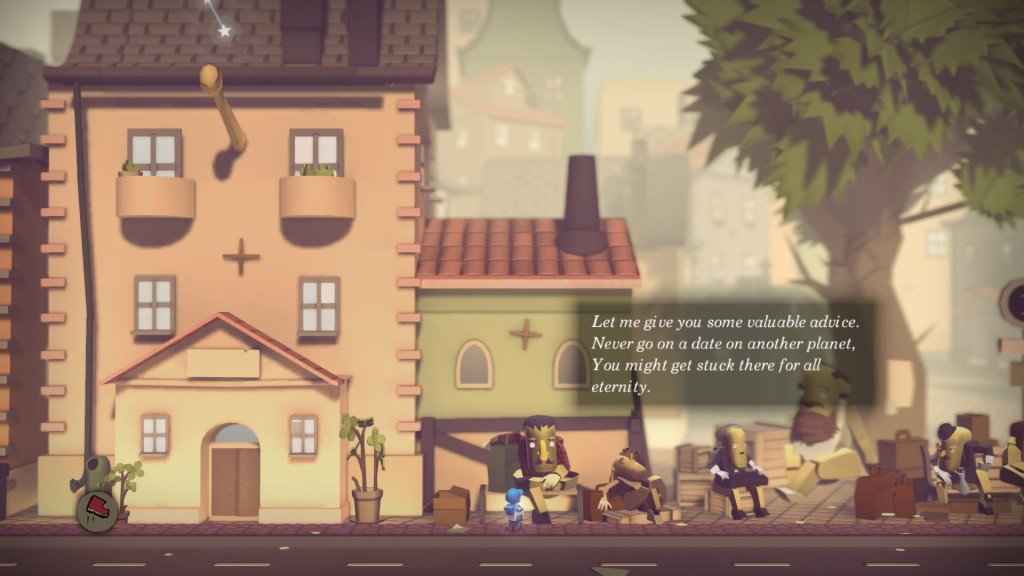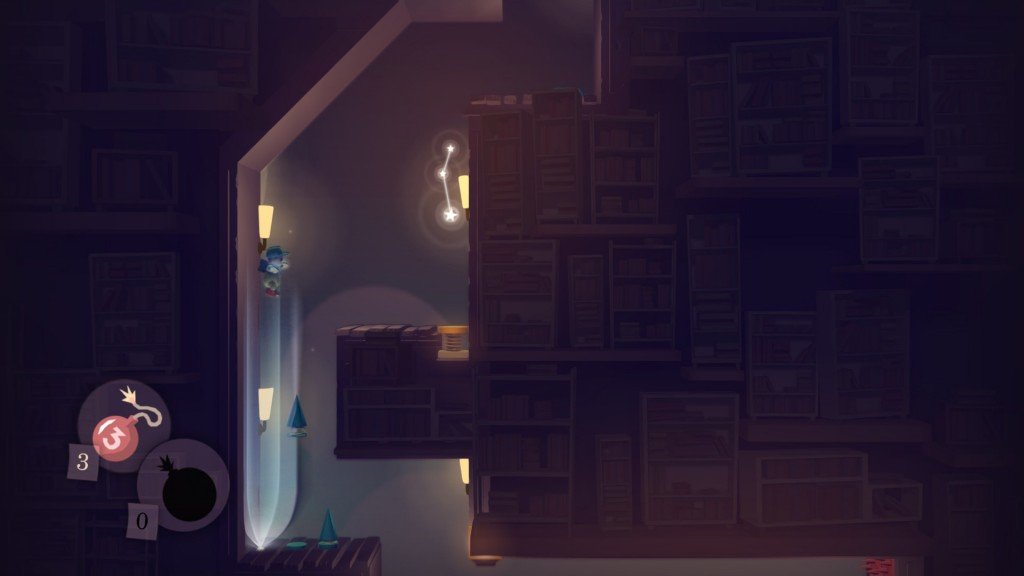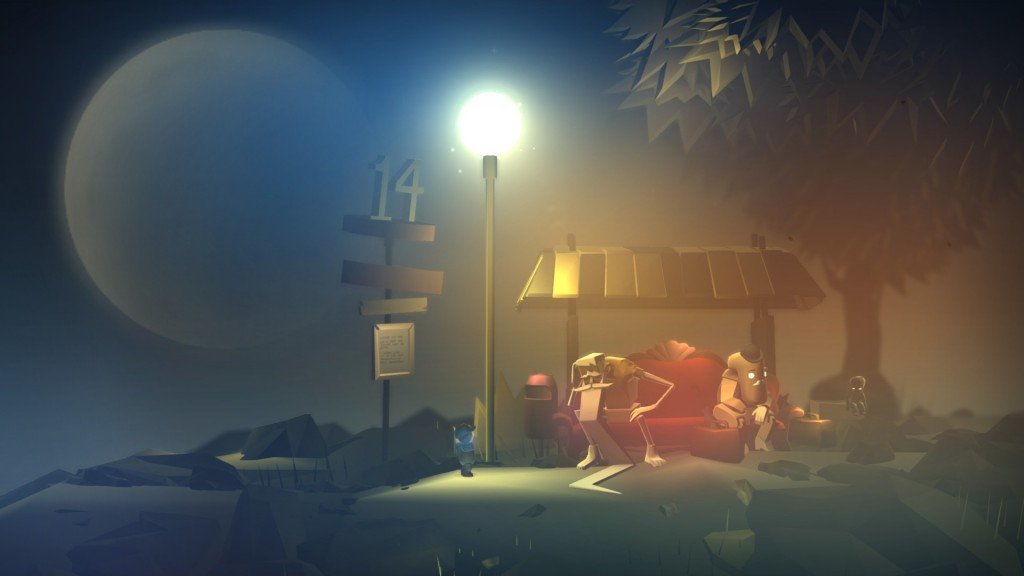Might and Delight’s Pid tells the tale of a young school boy named Kurt, who is swept off to a faraway land full of mystery, danger, and delight. After a modest introduction told via a brief slide-show of colorful art frames, Pid drops players onto an unknown planet, starting a journey of exploration and discovery.
Pid is a puzzle/platformer at its core, and the game ties these fundamentals together with a soft, minimalistic art-style and a quaint little narrative that supplies just enough information throughout the game to leave a memorable mark.
The game is broken up into many, many levels, and Pid often supplies players with more than one path to pursue, as well as several different strategies for reaching each goal. Players will spend most of their time traversing Pid’s exquisite collection of levels, but Might and Delight have also included some challenging and diverse boss encounters, in addition to several other uniquely fun confrontations.
During his time on the foreign planet, Kurt will encounter several peculiar inhabitants he can interact with. The dialogue is text-based and is complemented by indecipherable murmurs echoing in the background, which helps to add personality to the characters. The dialogue is the primary force keeping the story moving, but it is never overbearing. Instead, it gently edges the narrative forward at a consistent pace in-between the platforming segments without bogging the player down with pages of unnecessary text.
The primary tool at Kurt’s disposal is the ‘beam’, which enables him to create either horizontal or vertical gravity-defying paths that can help him reach otherwise unreachable platforms. At a glance, this ability seems quite simplistic, and you may wonder how it could possibly keep a game engaging for several hours. There’s no denying that some will find Pid to be a slow burn to begin with, but for those that keep faith in Might and Delight’s seemingly modest platformer, there is a wonderfully elegant game here that really will surprise you.
The main concern and/or issue a player is likely to have with Pid really depends on what kind of gaming background they have. Puzzle/platformer veterans should enjoy Pid’s elegant design and revel in its consistent challenge, but there are those who may struggle if they aren’t familiar with the genre.
To be clear, though, the game presents players with all the tools they need (and more) to complete the levels they are faced with. As with all great puzzle/platformers, Pid rewards patience and a healthy level of curiosity. Certain players may feel as though Kurt just isn’t equipped to deal with the developer’s imaginative level design, but those who persist shall be rewarded. You’ll be surprised at just how agile you can become as you progress further into the game; Kurt’s beam ability can manufacture some pretty incredible feats with enough practice.
The word ‘practice’ probably bears repeating here, as Pid is a game in which you are going to die. A lot. Death is inevitable in a game that requires frequent trial-and-error, but Pid succeeds in getting you back into the action quickly after a failed attempt. The checkpoint system is, for the most part, very good, but there are some rare occasions where you’ll die only to look at where you have re-spawned with frustration or even mild contempt.
The save system in Pid is a little troubling as it does not allow manual saving, only auto-saving. This means that Pid is a one-way trip to the end; once you’ve completed a particular area, there is rarely an opportunity to go back. A simple option to pick which level you would like to load and play would have been appreciated (levels could be unlocked upon completion), especially as the game has an abundance of collectible items and hidden areas to find. These secrets are great and encourage exploration and repeat playthroughs of the game; it’s just a shame that Pid doesn’t offer as much flexibility in discovering these secrets as one would hope. A possible reason for this design decision may simply be because of certain items you acquire later in the game, ones that could create gameplay imbalances if a player were to travel back to an earlier level with these advanced items/abilities.
With plenty to discover in Pid, the achievement hunters will have lots to do during subsequent playthroughs, but the most notable reasons for returning to Pid’s ethereal land are two of its modes: hard and co-op. With hard mode, Might and Delight have clearly taken the time to increase the complexity of each level by adding additional obstacles which demand increased player dexterity, instead of merely increasing the health of the enemies or causing Kurt to take more damage: hard mode actually requires players to deepen their understanding of the beam’s potential. Meanwhile, the co-op mode allows two players to explore Pid together or just try to outsmart each other using their individual beams.
This review would be incomplete without giving particular praise to Pid’s captivating soundtrack. The suitably named ‘Retro Family’ composed the music for the puzzle/platformer, and it quickly becomes a foundational pillar of what makes Pid, Pid. The upbeat guitar and smooth bass blend effortlessly with the look and feel of the game, elevating the overall experience.
Might and Delight’s Pid is one of the best indie platformers in recent memory and is arguably this year’s best, depending on how you define the term ‘indie platformer’. It may not rival the tactile platforming of a game like Super Meat Boy or match the ingenious puzzle design of a game such as Braid, but Pid isn’t trying to mirror those games. Rather, it has its own personality that deserves recognition for its unique blend of platforming, puzzle-solving, storytelling, art, and sound that results in a truly wonderful experience that fans of the genre should not miss.
Rating: 









This review is based on a review copy of the PC version of Pid developed by Might and Delight





